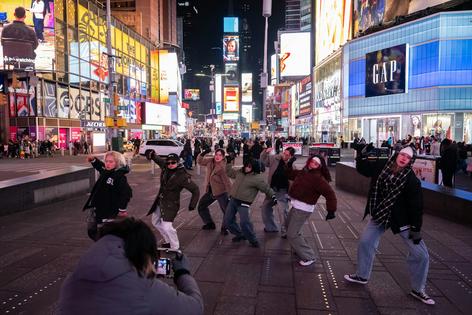Teens on social media: Red, blue and purple states are all passing laws to restrict and protect adolescents
Published in Political News
Children should be seen and not heard, or so the old saying goes. A new version of this adage is now playing out across the United States, as more states are passing laws about how children and teens should use social media.
In 2024, approximately half of all U.S. states passed at least 50 bills that make it harder for children and teens to spend time online without any supervision.
Some of the new laws in places such as Maryland, Florida, Georgia and Minnesota include provisions that require parental consent before a child or teenager under the age of 18 can use a social media app, for example. Other new laws prevent targeted marketing to teens based on the personal information they share online. Others recognize child influencers who have active social media followings as workers.
In 1998, long before the age of Instagram or TikTok, the federal government set a minimal baseline for internet safety for children under the age of 13 with the Children’s Online Privacy Protection Act. This law, known as COPPA, prevents websites from sharing children’s personal information, among other measures.
As law professors who study children’s online lives and the law, we are tracking state governments that are providing new protections to children when they use social media.
So far, almost all of these new protections are happening at the state level – it remains to be seen how the Trump administration will, if at all, weigh in on how children and teens are spending time on social media.
Almost half of teens ages 13 to 17 said in 2024 they are “almost constantly” online and virtually all of them use the internet every day.
And approximately 40% of children ages 8 to 12 use social media on a daily basis.
Research shows that adolescents who spend more than three hours a day on social media have an increased risk of anxiety and depression.
Almost half of teens have faced online bullying or harassment, with older teen girls most likely to have experienced this. Social media use has been linked to self-harm in some cases.
In 2023, 41 states and the District of Columbia sued Meta, the parent company of Facebook and Instagram, claiming that it was harming children. Although Meta tried to have the case dismissed, it is still moving forward.
States including New York and California have made a number of legal changes since 2023 that make it safer for adolescents to spend time online.
California, for example, has expanded information protection for young social media users by limiting apps from collecting kids’ and teens’ geolocation data.
Utah and Florida have raised the age for social media use. Children under the age of 14 cannot open their own social media account, and the platforms are supposed to shut down any such accounts used by children in those states.
In 2024, the Utah Legislature determined that social media was similar to regulated “products and activities” like cars and medication that create risks for minors.
Utah’s new law requires social media platforms to verify a user’s age, such as by requiring a photo ID.
A 2024 Tennessee law allows minors to open their own accounts but requires that social media companies ensure that anyone under the age of 18 has parental consent to do so.
Some states, including Texas and Florida, are trying to create a different experience for minors once they have an account on a social media platform. They are blocking apps from sending targeted advertisements to minors or, in states such as New York, curating social media feeds based on an algorithm instead of based on the minors’ own choices.
A growing number of states have also focused on creating more protections for children influencers and vloggers, who regularly post short videos and images on social media and often have other young people following their content. So far, California, Illinois and Minnesota have passed child digital entertainer laws since 2023.
All of these laws set up financial protections for child influencers. Illinois’ law requires child influencers to receive a portion of the profits they make from their content. Minnesota’s law includes privacy protections: forbidding children under the age of 14 from working as influencers and giving them the right to later delete content, even when their parents have created the post or video.
These laws face different legal challenges. For example, some private industry groups claim these laws restrict free speech or the rights of parents. The U.S. Supreme Court is now considering – for the first time since 1997 – the constitutionality of age restrictions for social media usage.
States across the political spectrum, as well as social media companies themselves, are creating more protections for kids whose online activity might suggest that federal law reform will finally happen.
Congress has considered new online privacy legislation for children in the past 25 years, including banning targeted ads. But nothing has been enacted.
There is no clear indication that the Trump administration will make any substantial changes in existing law on children and internet privacy. While federal agencies, including the Federal Trade Commission, could take the lead on protecting children online, there has been little public discussion of issues involving children and media access.
Trump’s choice for surgeon general, Janette Nesheiwat, said in 2024, “Social media has had a tremendous negative impact on all aspects of society, especially our younger generations.” It’s unclear how widely this view is shared within the new administration.
On other social media issues, such as the future of TikTok, Trump’s nominees and advisers have been divided. Particularly in an administration in which “the president owns a social media company, and one of his main associates owns another,” the future scope of federal action to protect children online is uncertain. This is likely to prompt states to advance laws that create more protections for children on social media.
Even though social media platforms have national and global reach, we believe that state-by-state leadership might be the best way to make laws in which the needs and rights of children and their families are seen, heard and protected.
This article is republished from The Conversation, a nonprofit, independent news organization bringing you facts and trustworthy analysis to help you make sense of our complex world. It was written by: Naomi Cahn, University of Virginia and Leah A. Plunkett, Harvard University
Read more:
What’s happening on RedNote? A media scholar explains the app TikTok users are fleeing to – and the cultural moment unfolding there
Mounting research documents the harmful effects of social media use on mental health, including body image and development of eating disorders
‘It is hijacking my brain’ – a team of experts found ways to help young people addicted to social media to cut the craving
Leah A. Plunkett is the Reporter for the Uniform Law Commission Study Committee on the Definition and Protection of a Child's Interest in the Child's Name, Image, Likeness, or other Intellectual Property. The views expressed in this piece are offered solely in her individual capacity, and not on behalf of the Commission or her employer.
Naomi Cahn does not work for, consult, own shares in or receive funding from any company or organization that would benefit from this article, and has disclosed no relevant affiliations beyond their academic appointment.


































































Comments